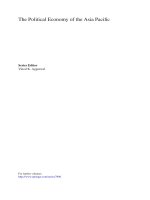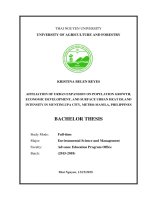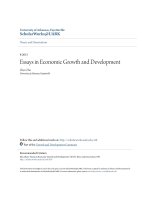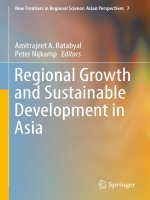Economic growth and economic development 716
Bạn đang xem bản rút gọn của tài liệu. Xem và tải ngay bản đầy đủ của tài liệu tại đây (82.86 KB, 1 trang )
Introduction to Modern Economic Growth
Exercise 15.23. Derive equation (15.47).
Exercise 15.24. Derive equation (15.49).
Exercise 15.25. Complete the proof of Proposition 15.14 and show that there
cannot exist any other constant growth path equilibrium.
Exercise 15.26. * Show that if σ < 1, the constant growth path equilibrium in
Proposition 15.14 is globally stable. Show that if σ > 1, it is unstable. Relate your
results to Proposition 15.7.
Exercise 15.27. Now let us use the results of Proposition 15.14 to revisit the discussion of the experiences of continental European economies provided in Blanchard
(1997). Consider the model of Section 15.6. Discuss how a wage push, in the form
of a wage floor above the market clearing level will first cause unemployment and
then if σ < 1, it will cause capital-biased technological change. Can this model
shed light on the persistent unemployment dynamics in continental Europe? [Hint:
distinguish two cases: (i) the minimum wage floor is constant; (ii) the minimum
wage floor increases at the same rate as the growth of the economy].
Exercise 15.28. * The analysis in the text has treated the supply of the two factors
as endogenous and looked at the impact of relative supplies on factor prices. Clearly,
factor prices can also affect relative supplies. In this exercise, we look at the joint
determination of relative supplies and technologies.
Let us focus on a model with the two factors corresponding to skilled and unskilled labor. Suppose a continuum υ of unskilled agents are born every period, and
each faces a flow rate of death equal to υ, so that population is constant at 1 (as
in Section 9.8 above). Each agent chooses upon birth whether to acquire education
to become a skilled worker. For agent x it takes Kx periods to become skilled, and
during this time, he earns no labor income. The distribution of Kx is given by the
distribution function Γ(K) which is the only source of heterogeneity in this economy.
The rest of the setup is the same as in the text. Suppose that Γ(K) has no mass
points. Define a BGP as a situation in which H/L and the skill premium remain
constant.
(1) Show first that in BGP, there is a single-crossing property: if an individual
with cost of education Kx chooses schooling, another with Kx0 < Kx must
702









